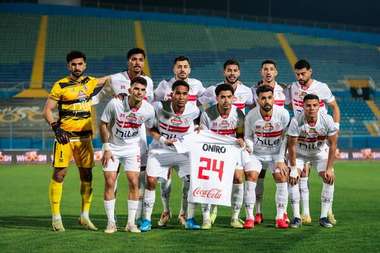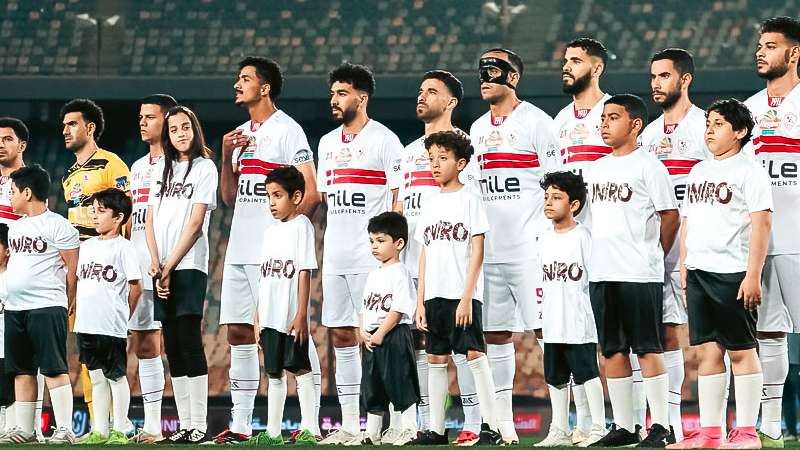Injury Avalanche Strikes Zamalek Ahead of CAF Cup Showdown
17 October 2025

Injury Storm Throws Ferreira's Plans into Question
The Zamalek technical staff, led by Belgian coach Janic Ferreira, announced the 23-man squad for the CAF Confederation Cup first leg against Dikidaha FC, scheduled for six o’clock in Cairo, marking the start of the tie in the round of 32. The list mixes veterans with promising reserves as the club navigates a surge of injuries and fatigue that loom over the squad.
Goalkeepers: Mohamed Sobhi, Mohamed Awad, Mahmoud El Shenawy.
Defenders: Omar Gaber, Baron Oshing, Mahmoud Hamdi “El-Wensh”, Hossam Abdel Megid, Mohamed Ismail, Salah Mecdud, Ahmed Foutouh.
Midfielders: Ahmed Rabee, Mohamed Ghada, Mohamed El-Sayed, Saif Jaafar, Nasser Maher, Ahmed Hamdi, Abdel Hamid Maali, Ahmed Shreef, Shiko Banza, Juan Pizaro.
Forwards: Seif Eldin El Jaziry, Amr Nasser.
Absences and a tricky situation
The white squad arrives with a heavy cloud over it, as several key players are sidelined for different physiological reasons. Ferreira faces a compounded challenge in replacing up to seven players and maintaining balance in both the engine room and the frontline, especially with tight schedules and ongoing domestic and continental commitments.
Sources within the club indicate that seven players will miss the match due to physical fatigue, including three core midfielders who were granted rest to prevent a longer-term muscle problem. This signals a broader issue about load management and recovery strategies as the team fights on multiple fronts.
In particular, Abdallah El-Saeed, veteran midfielder Donya, and Moroccan Mahmoud Bentayk miss the game due to muscle fatigue. Losing these three, especially in midfield where organization and tempo are built, represents a significant strategic blow as Ferreira looks to shape play and stabilize ball circulation and recovery of possession.
Resting these players is a precautionary measure designed to avert more serious injuries, with the fear that unresolved fatigue could lead to extended lay-offs that hurt the team in the near future.

Four players in rehabilitation
The injury list also includes four players who are undergoing rehabilitation: Nasser Mansi and Mohamed Shahat continue recovery from a hamstring issue, Adi Debagh is receiving treatment for a groin problem, and Adam Kaid is undergoing treatment for a calf issue. Recurrent soft-tissue injuries raise questions about the team’s conditioning program and the adequacy of recovery protocols, given the intensity of fixtures and a packed calendar.
These recurring injuries affect the offensive and creative repertoire, as the absence of Mansi and Debagh limits depth in attack, while Shahat’s absence reduces the options in the central midfield and transition play. Ferreira’s task is to maximize the impact of the available players and leverage younger squad members and reserves to fill the gaps.

Technical exclusion draws debate
One notable decision in the squad selection is the exclusion of Mehdi Suleiman for technical reasons, despite the goalkeeper being a high-cost acquisition. The choice underscores ongoing questions about transfer strategy and whether the roster balance aligns with the coach’s tactical plan, especially with two established goalkeepers still in contention and limited use for a third option.
As a result, Ferreira must rely on the rest of the squad and perhaps younger players stepping into senior roles to stave off a potential drop in performance and to maintain competitive balance across the two legs.
Depth tested and bench expectations
With the absence of key playmakers and attacking firepower, Zamalek enters the Dikidaha match with a squad that is deeper in numbers than in experience at the moment. Ferreira will need to extract efficiency from the reserves and ensure the team can maintain pace, tempo, and pressing intensity, while also guarding against fitness issues that can derail a continental campaign.
Despite the hurdles, the club remains intent on using the CAF Confederation Cup as a platform to regain confidence and momentum, especially with expectations of a strong home support at the Cairo stadium. The tie against Dikidaha is framed as a potential turning point in a season that has had its moments of difficulty in domestic competition and fatigue management.
Officials note that the match will be officiated by a Ethiopian refereeing team led by Maanohy Ledetssadik, with Timssgin Samuel Atang and Asbher Tafesi Beriso as assistants, while Efram Dabili Capita will act as the fourth official. The match observer is Mohammed Ahmed Suleiman from Sudan, and an Algerian referee, Mehdi A Bide, oversees match officiating standards. The organizing crew will aim to ensure a fair contest, given the stakes at stake for both teams.
A trip down memory lane and continental hopes
The game carries a nostalgic note too, recalling a dramatic past meeting in the CAF Champions League 2019/2020 when Zamalek delivered a resounding pair of performances—7-0 in the first leg and 6-0 in the return—at the Burj Al Arab stadium in Alexandria after CAF decided not to use Somalia’s stadiums at that time.
While that history provides a psychological edge, Ferreira has insisted that respect for the opponent is crucial, arguing that African football has become full of surprises and that underestimating Dikidaha could backfire. Zamalek’s ongoing pursuit of continental glory has seen the club lift the Confederation Cup in 2019 and 2024 against RS Berkane of Morocco, reinforcing their status as perennial contenders in African club football.
Ultimately, the coach and team aspire to a fresh start in Cairo, with the support of a home crowd, to set the tone for the rest of the campaign and rebuild faith among fans amid a challenging start to the season.
In the end, the whistle and the heart will decide
The match promises drama, tactical adjustments, and a test of depth at Zamalek. Ferreira’s decisions in the coming days may define the team’s trajectory in Africa as much as they do in Egypt. If nothing else, the CAF Cup remains a stage where legends can be re-scripted and new heroes can emerge—and perhaps a bench that looks deep enough to swim in will finally become a treasure chest rather than a reminder of what could have been.
Punchline 1: If injuries were a sniper’s target, Zamalek would be the only team armed with a full medical corps and still miss the bullseye—talk about practice makes perfect at missing the hurt.
Punchline 2: They say depth in football wins you championships; at Zamalek it seems depth comes with a side of drama, a dash of youth, and enough drama to fill a season of comedies—enjoy the bench show, folks.



